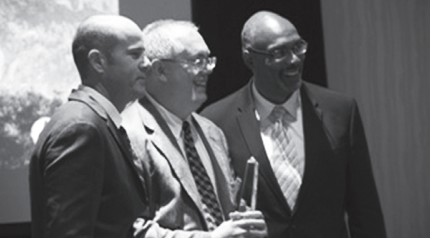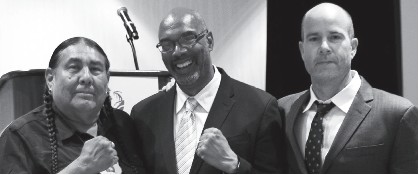November 29, 2016
By Kate Bartholomew, Sierra Club Atlantic Chapter 2016-’17 CCL Delegate

From left to right, Sierra Club E.D. Micheal Brune, Atlantic Chapter member Wayne Howard and S. C. BoD President Aaron Mair at the annual awards presentation
How often have you thought, or overheard someone else give voice to your unspoken opinion, that the National Sierra Club Board of Directors seemed aloof and disconnected from the grassroots volunteers and the environmental struggles they engage in on a daily basis? I know I have, far more times than I can count over the course of my involvement with the Club. But, when I try to see it from the perspective of the Board, I realize it can be extremely difficult to be deeply engaged with 2.4 million members and supporters, parsed out in 64 local Chapters, further divided out into all the many Groups within each Chapter. If that level of involvement were part of the job description, no one would ever run for the National Board.
Fortunately, the Sierra Club devised a solution in the form of the Council of Club Leaders (CCL), a group comprised of delegates from each of the 64 Chapters, which interacts directly with the National Board of Directors and brings forth resolutions, sponsored by the grassroots to present to the Board. In the Atlantic Chapter, the Delegate and Alternate are selected by the Chapter Executive Committee from its duly elected At-Large Delegates. Both serve a two-year term.
The 2016 CCL and Annual Board of Directors Meeting
This year’s event was held Wednesday, September 7th, through Saturday, September 10th, in Oakland, California, across the bay from San Francisco, and where the new National Sierra Club Offices are located. All of the CCL workshops, meetings and presentations occurred in the new office space, which is much newer and sleeker in design than the old space, and carries a considerably slimmer price tag. I think the key feature I found most uplifting was the vast amount of natural light available to the staff - definitely an improvement.
Over the course of the first few days, the planned presentations dealt with Diversity, Equity and Inclusion; State of the Chapter; Developing Leaders Engaged in Movement Building; Chapter Fundraising; and Building Power for Change through Leadership Development. We also had a choice to attend smaller breakout sessions devoted to topics including Ready for 100, Supporting the Dakota Access Pipeline Fight; Beyond Dirty Fuels; and Sierra Club Food and Agriculture Landscape Analysis. It was an incomprehensible amount to absorb in two days. Thankfully we were each sent home with a flash drive, which I will download and share with our office staff so this knowledge can be uploaded to the Chapter website for all to enjoy.
Following the educational portion of the gathering, we turned our attention to the true purpose of the meeting: the resolutions sent in by Chapters around the country for CCL consideration to present to the National Board of Directors. A total of 15 resolutions had been sent to the CCL Resolutions Committee from various Chapters; 11 were being recommended for adoption, 4 were not. All had to be discussed and considered. Yes, Roberts Rules are followed, and there is a Parliamentarian, but the same can be said of the British House of Commons. In truth, the CCL behaved far better than the House of Commons - or the House of Lords – members were just extremely vocal. We did get through all 15 resolutions and voted affirmatively on 10 of them, including one, Resolution #11, the Atlantic Chapter had decided to support sponsored by the Montana Chapter that urged the National Club to adopt an ultimate goal of no more than a one degree Celsius increase in global temperature. Other resolutions approved for recommendation to the Board of Directors included three focusing on improving the relationship between National staff and Chapters:
Resolution #2: Legal Strategy (sponsored by the Iowa Chapter) ~ The CCL requests that the Sierra Club Board of Directors ensure that litigation decisions be made in collaboration with affected Chapters.
Resolution #3: Encouraging National Campaign Staff to Respect Work of Chapters and Groups (sponsored by the Lone Star Chapter) ~ The Council of Club Leaders requests the Board of Directors to encourage the National campaign staff to become familiar with and respect the work of, and community relationships developed by, chapter and group staff and volunteers, and to reflect that knowledge and respect when dealing with the press and the public.
Resolution #4: Encouraging New Employees to Attend a Chapter or Group Event or Activity (sponsored by the New Jersey Chapter) ~ The Council of Club Leaders requests the Board of Directors to adopt a policy encouraging those newly hired Sierra Club employees whose duties include regularly engaging with volunteers to attend at least one chapter or group executive committee meeting, conservation meeting, or other comparable event or activity within the first six months of employment to help staff and volunteer leaders become better acquainted with each other’s roles.
Additional resolutions called for better scientific rigor in fundraising appeals (Resolution #1), broadening of the Club’s Clean Energy Vision to encourage bicycling and walking as attractive options (Resolution #5), enhanced and permanent support for local outings programs (Resolution #8), banning injection well activity in seismic-prone localities (Resolution #9) and taking a position supporting regulations aimed at reducing production and consumption of Sugar Sweetened Beverages (Resolution #15). All these adopted resolutions were presented to the Board of Directors at the joint portion of our Annual meetings on Saturday, September 10th. At this point, no action has been taken on any of the resolutions. Information about the resolutions can also be found on our Chapter website.
The culmination of the series of workshops, presentations and meetings was Saturday night’s Annual Award’s Presentation where individuals, groups and organizations are recognized for their contributions to the world of conservation and the ideals embodied in the mission and vision of the Sierra Club. Recipient of the Club’s highest honor, the John Muir Award, Indigenous Environmental and Social Justice Activist Tom Goldtooth flew in directly from Sacred Stone Camp in North Dakota where he and representatives from many other First Nation tribes and allies join to lend their support to the Standing Rock Sioux as they fight the Dakota Access Pipeline. Tom’s comments when accepting the award were both humbling and inspiring, and I would wish all readers of this newsletter could have heard them spoken as I did that evening. In lieu of that, there is always this uploaded video:

From left to right, John Muir award recipient Tom Goldtooth, President Aaron Mair and Executive Director Micheal Brune
The Atlantic Chapter had nominated two individuals for two separate awards this year. Given the apparent plethora of nominations, the Chapter was fortunate to have one of its nominees selected. Wayne Howard from the Rochester Group along with Dr. A.P. Lino Grima of North York, Ontario, Canada, his co-chair on the Sierra Club’s Binational Great Lakes Committee, received the Raymond J. Sherwin International Award, which honors extraordinary volunteer service toward international conservation. More information about Wayne’s award and his work on Great Lakes issues will be forthcoming in the Winter Sierran.
Role of the Council of Club Leaders
Mission of the Council of Club Leaders
• Build unity within the Club by facilitating open, meaningful and responsive
• two-way communication between national entities and grassroots leadership.
• Represent chapter and group perspectives, give voice to chapter and group concerns and assist chapters and groups in their work to achieve
• Provide advice and assistance to the Board of Directors and other Club entities on matters affecting chapters and groups.
• Be knowledgeable about available resources and training programs to assist national Club entities in building the Club’s leadership capacity.
Responsibilities of the Council
• Identify the interests of grassroots leaders and facilitate channels for solutions; identify and advocate solutions needed to help chapters and groups meet Club goals.
• Identify and advocate solutions for the Club to meet chapter and group goals.
• Ensure that chapter concerns about Club policies and procedures are communicated to the appropriate entity.
• Provide an inclusive, ongoing forum for in-depth deliberation on emerging Club issues.
• Provide an opportunity for chapters to consider Council resolutions affecting chapters prior to CCL voting.
• Serve as a source of experienced leaders for national projects.
• Represent the Club membership as delegates to an annual meeting for the purpose of discussing the activities and operation of the Club, and making recommendations to the Board.
• Be a conduit for the flow of information among national entities, chapters and groups, including opportunities for chapter/group training needs.
Responsibilities of Each Delegate
• Attend all Council meetings to serve as spokesperson for his/her chapter and groups in Council deliberations.
• Serve as key liaison between nation-al entities and her/his chapter, and perform other duties and responsibilities as established by the Council.
• Educate his/her chapters and groups on the role of the Council.
• Educate his/her chapters and groups on relevant Club policies, programs and training.
• Report the work and recommendations of the Council back to his/her chapters in a timely manner.
.
Council Actions
• Participate directly with the Board in an annual meeting of the Sierra Club and any other meetings that the Board may authorize.
• Help to mobilize chapters and groups to take action on national priorities.
• Educate grassroots leaders about the work of the Club’s national volunteer and staff entities.
• Identify, recruit and nurture future Club leaders through the CCL
• Solicit candidates for national leadership positions.
• Present the Council’s annual work plan to the Board of Directors for approval, and report to the Board and CCL annually on accomplishments, barriers, needs and budget.
• Create and sunset CCL sub-entities as needed to execute the charge and work plan, appoint sub-entity chairs and members, allocate sub-entity funds, assign their responsibilities, and evaluate their performance.